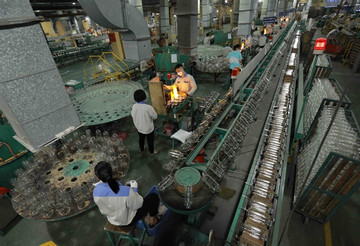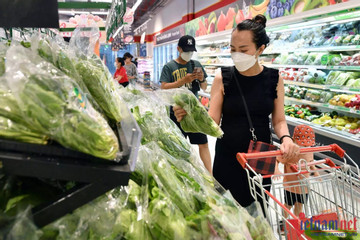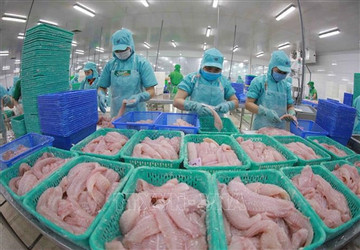- © Copyright of Vietnamnet Global.
- Tel: 024 3772 7988 Fax: (024) 37722734
- Email: evnn@vietnamnet.vn
Vietnam's economy
Update news Vietnam's economy
Vietnam has about 20 billionaires: economist
The total assets of the 12 Vietnamese largest private business groups are estimated at $70 billion, which is only equal to the assets of one foreign corporation.
Part 2: Vietnam seeks US-recognized market economy status
Vietnam is looking forward to being recognized as a market economy by the US, which would bring more opportunities to Vietnam’s exports. Many countries have voiced their support of Vietnam.
Economic gains provide solid base for steady growth in 2024
Positive economic signs recorded last year are anticipated to serve as the foundation for the Vietnamese economy to grow well in the year ahead, according to Minister of Planning and Investment Nguyen Chi Dung.
HCMC sees lower economic indicators, tough year ahead
The Index of Industrial Production (IIP) has slipped, export turnover has dropped, and more companies have suspended operation. Economists have warned that 2023 will be a tough year.
Mixed feelings about Vietnam’s economy next year
In 2023 and subsequent years, it is forecasted that the Vietnamese economy will face many difficulties and challenges.
Vietnam’s economic prospects stay bright despite dim global outlook
The growth momentum in 2022 has created the space and conditions for effective monetary and fiscal maneuvering in 2023.
The crucial plans ahead in 2023 for Vietnam’s state-owned enterprises
While state-owned enterprises made strong efforts to recover during 2022, more tasks and plans are waiting for them in the path ahead to show their key role in the national economy.
Preparing for the worst
The Government has set a GDP growth target of 6.5% for 2023 although most developed economies are on the verge of recession, especially the U.S. and the European Union. Businesses and households should prepare for the worst-case scenario.
Which sectors are bound for breakthroughs?
Analysts and investors still expect certain industry groups will outperform the general market in 2023, based on their own stories and the varying degrees of impact from the economic context and the outlook for this year.
Socio-economic recovery programme reaps fruit
After two years of struggling to deal with COVID-19, seemingly the biggest game changer of the global economy in the century, Vietnam has found its way to respond appropriately to the pandemic and even thrive.
'Dynamic business force' needed as first and second generation of executives ages
After Doi Moi (renovation), when a multi-sector economy was recognized, more Vietnamese business people began appearing.
Vietnam jumps from bottom of Covid-19 Recovery Index to top position
Thanks to Vietnam’s strong recovery in production, low inflation, and financial market stabilization, Nikkei Asia has lifted its Covid-19 Recovery Index for Vietnam from the bottom of the list to the second spot in its latest edition.
High inflation is biggest risk for Vietnam’s economy: officials
Statistics show a stable situation now, but there are warning signs that if Vietnam cannot curb inflation, the situation will be insecure.
Clear and effective policies help mitigate external shock impact
Despite the global economy enduring an array of unpredictable fluctuations, the timely introduction and effective implementation of Government policies have contributed to Vietnam avoiding external shocks whilst also promoting growth.
Foreign financiers believe Vietnam likely to control inflation at 4% this year
Major foreign financial institutions such as IMF, ADB, and AMRO have made different forecasts on Vietnamese inflation this year, although they all anticipate the figure to hover around 4%.
VN stocks could be in sweet spot as GDP growth surges, stronger growth forecast
The Vietnamese economy grew by 7.7 per cent in the second quarter, one of the fastest rates in a decade, and is expected to expand even faster this quarter, driven by an ongoing burst of consumption.
Vietnam firmly rebounds amid challenges
HSBC Global Research expects Vietnam to be among the region's top growing nations, as it was one of the world's few countries to record growth in two consecutive years since the pandemic.
Economy bounces back faster than expected
Vietnam’s economy continued to expand in the second quarter of the year, with gross domestic product (GDP) growing 7.7% year on year, the highest quarterly growth rate in 11 years.
The paradoxes of growth
The high economic growth rate and the prosperity of a number of business fields in H1 demonstrates the judiciousness of the decisions to change the country's Covid-19 prevention and control strategy.
VN stock market's outlook still bright in second half of 2022
The Vietnamese stock market witnessed a strong correction recently, mainly due to international macroeconomic factors, including global soaring inflation and the US Federal Reverse rate hikes.



















